Impact of COVID-19 on UK High Street Retail: John Lewis & Partners
VerifiedAdded on 2023/06/18
|16
|3936
|136
AI Summary
This dissertation proposal investigates the impact of the COVID-19 pandemic on the declining high street retail industry in the UK, using John Lewis & Partners (JLP) as a case study. The research aims to identify the factors contributing to JLP's survival during the crisis. It will determine the state of the high street retail industry before the pandemic, examine key strategic decisions made by JLP throughout its history, analyze the pandemic's impact on both struggling and surviving retailers, and describe JLP's adaptations and future vision. The methodology employs both interpretivism and positivism research philosophies, inductive and deductive research approaches, and mixed research methods (qualitative and quantitative). Data will be collected from secondary sources like articles, journals, and books, and analyzed using thematic analysis. Ethical considerations and a project timeline are also included. The proposal highlights the novelty of the topic due to its relevance to the current global pandemic and its effects on the retail sector.
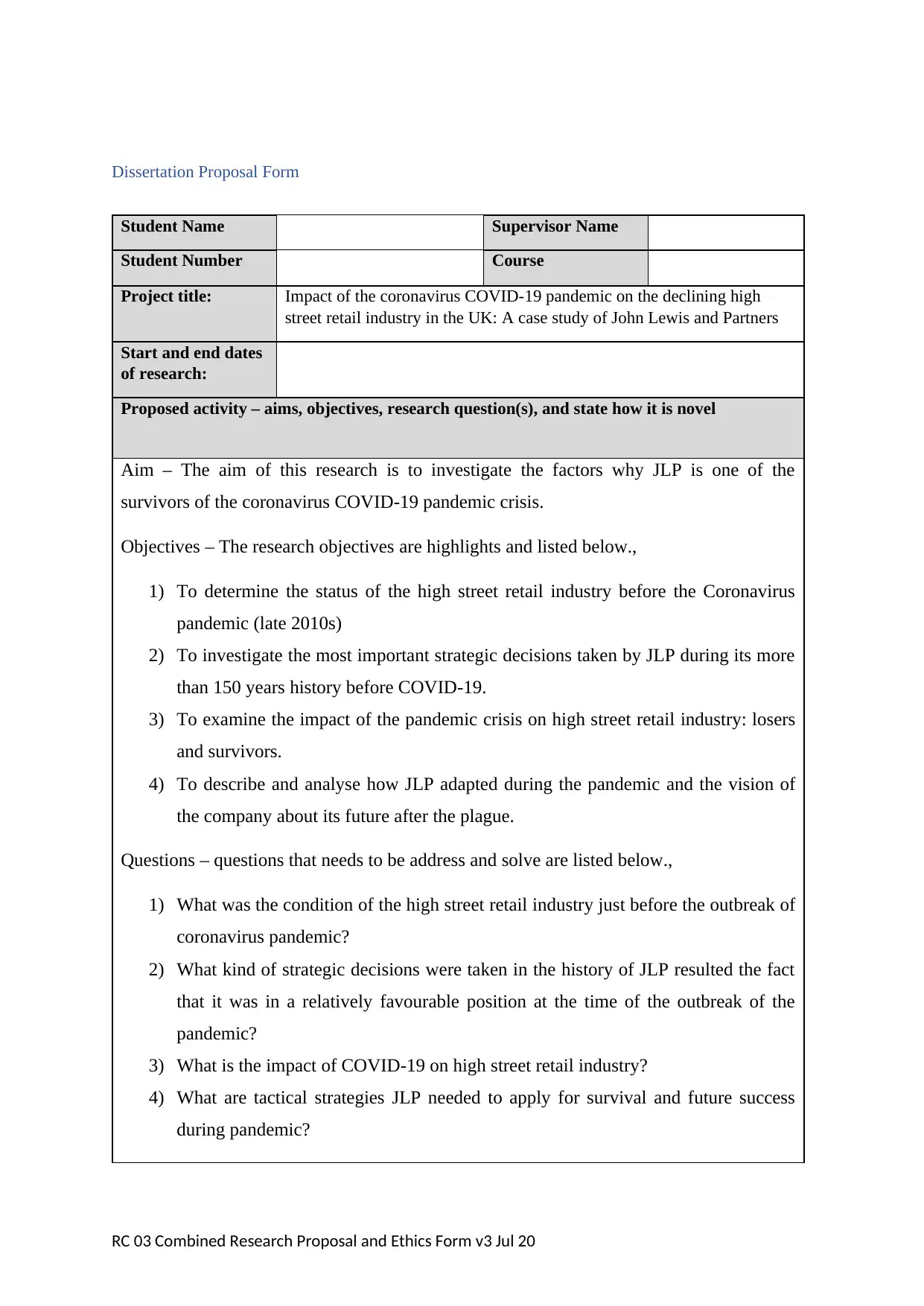
Dissertation Proposal Form
Student Name Supervisor Name
Student Number Course
Project title: Impact of the coronavirus COVID-19 pandemic on the declining high
street retail industry in the UK: A case study of John Lewis and Partners
Start and end dates
of research:
Proposed activity – aims, objectives, research question(s), and state how it is novel
Aim – The aim of this research is to investigate the factors why JLP is one of the
survivors of the coronavirus COVID-19 pandemic crisis.
Objectives – The research objectives are highlights and listed below.,
1) To determine the status of the high street retail industry before the Coronavirus
pandemic (late 2010s)
2) To investigate the most important strategic decisions taken by JLP during its more
than 150 years history before COVID-19.
3) To examine the impact of the pandemic crisis on high street retail industry: losers
and survivors.
4) To describe and analyse how JLP adapted during the pandemic and the vision of
the company about its future after the plague.
Questions – questions that needs to be address and solve are listed below.,
1) What was the condition of the high street retail industry just before the outbreak of
coronavirus pandemic?
2) What kind of strategic decisions were taken in the history of JLP resulted the fact
that it was in a relatively favourable position at the time of the outbreak of the
pandemic?
3) What is the impact of COVID-19 on high street retail industry?
4) What are tactical strategies JLP needed to apply for survival and future success
during pandemic?
RC 03 Combined Research Proposal and Ethics Form v3 Jul 20
Student Name Supervisor Name
Student Number Course
Project title: Impact of the coronavirus COVID-19 pandemic on the declining high
street retail industry in the UK: A case study of John Lewis and Partners
Start and end dates
of research:
Proposed activity – aims, objectives, research question(s), and state how it is novel
Aim – The aim of this research is to investigate the factors why JLP is one of the
survivors of the coronavirus COVID-19 pandemic crisis.
Objectives – The research objectives are highlights and listed below.,
1) To determine the status of the high street retail industry before the Coronavirus
pandemic (late 2010s)
2) To investigate the most important strategic decisions taken by JLP during its more
than 150 years history before COVID-19.
3) To examine the impact of the pandemic crisis on high street retail industry: losers
and survivors.
4) To describe and analyse how JLP adapted during the pandemic and the vision of
the company about its future after the plague.
Questions – questions that needs to be address and solve are listed below.,
1) What was the condition of the high street retail industry just before the outbreak of
coronavirus pandemic?
2) What kind of strategic decisions were taken in the history of JLP resulted the fact
that it was in a relatively favourable position at the time of the outbreak of the
pandemic?
3) What is the impact of COVID-19 on high street retail industry?
4) What are tactical strategies JLP needed to apply for survival and future success
during pandemic?
RC 03 Combined Research Proposal and Ethics Form v3 Jul 20
Paraphrase This Document
Need a fresh take? Get an instant paraphrase of this document with our AI Paraphraser
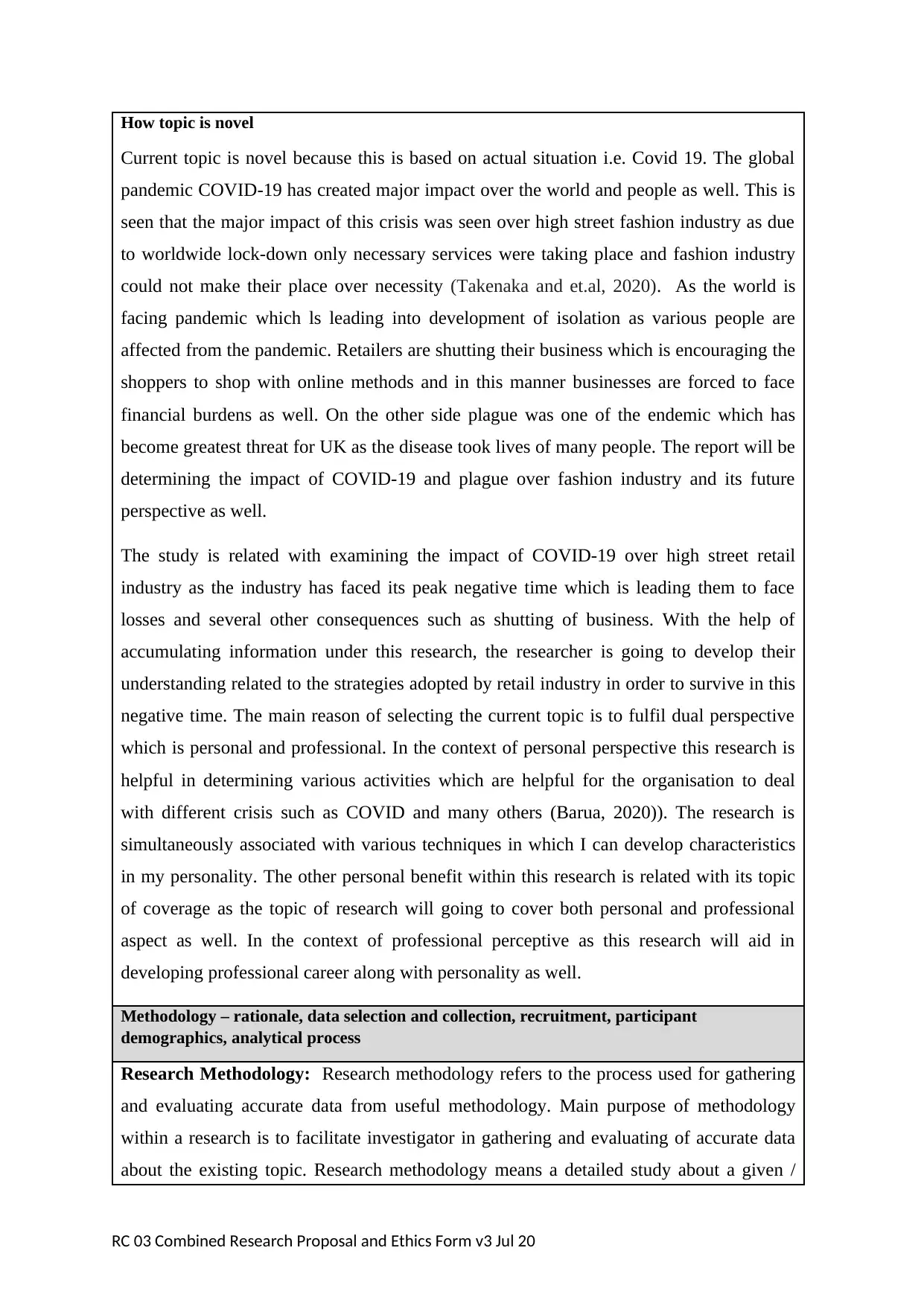
How topic is novel
Current topic is novel because this is based on actual situation i.e. Covid 19. The global
pandemic COVID-19 has created major impact over the world and people as well. This is
seen that the major impact of this crisis was seen over high street fashion industry as due
to worldwide lock-down only necessary services were taking place and fashion industry
could not make their place over necessity (Takenaka and et.al, 2020). As the world is
facing pandemic which ls leading into development of isolation as various people are
affected from the pandemic. Retailers are shutting their business which is encouraging the
shoppers to shop with online methods and in this manner businesses are forced to face
financial burdens as well. On the other side plague was one of the endemic which has
become greatest threat for UK as the disease took lives of many people. The report will be
determining the impact of COVID-19 and plague over fashion industry and its future
perspective as well.
The study is related with examining the impact of COVID-19 over high street retail
industry as the industry has faced its peak negative time which is leading them to face
losses and several other consequences such as shutting of business. With the help of
accumulating information under this research, the researcher is going to develop their
understanding related to the strategies adopted by retail industry in order to survive in this
negative time. The main reason of selecting the current topic is to fulfil dual perspective
which is personal and professional. In the context of personal perspective this research is
helpful in determining various activities which are helpful for the organisation to deal
with different crisis such as COVID and many others (Barua, 2020)). The research is
simultaneously associated with various techniques in which I can develop characteristics
in my personality. The other personal benefit within this research is related with its topic
of coverage as the topic of research will going to cover both personal and professional
aspect as well. In the context of professional perceptive as this research will aid in
developing professional career along with personality as well.
Methodology – rationale, data selection and collection, recruitment, participant
demographics, analytical process
Research Methodology: Research methodology refers to the process used for gathering
and evaluating accurate data from useful methodology. Main purpose of methodology
within a research is to facilitate investigator in gathering and evaluating of accurate data
about the existing topic. Research methodology means a detailed study about a given /
RC 03 Combined Research Proposal and Ethics Form v3 Jul 20
Current topic is novel because this is based on actual situation i.e. Covid 19. The global
pandemic COVID-19 has created major impact over the world and people as well. This is
seen that the major impact of this crisis was seen over high street fashion industry as due
to worldwide lock-down only necessary services were taking place and fashion industry
could not make their place over necessity (Takenaka and et.al, 2020). As the world is
facing pandemic which ls leading into development of isolation as various people are
affected from the pandemic. Retailers are shutting their business which is encouraging the
shoppers to shop with online methods and in this manner businesses are forced to face
financial burdens as well. On the other side plague was one of the endemic which has
become greatest threat for UK as the disease took lives of many people. The report will be
determining the impact of COVID-19 and plague over fashion industry and its future
perspective as well.
The study is related with examining the impact of COVID-19 over high street retail
industry as the industry has faced its peak negative time which is leading them to face
losses and several other consequences such as shutting of business. With the help of
accumulating information under this research, the researcher is going to develop their
understanding related to the strategies adopted by retail industry in order to survive in this
negative time. The main reason of selecting the current topic is to fulfil dual perspective
which is personal and professional. In the context of personal perspective this research is
helpful in determining various activities which are helpful for the organisation to deal
with different crisis such as COVID and many others (Barua, 2020)). The research is
simultaneously associated with various techniques in which I can develop characteristics
in my personality. The other personal benefit within this research is related with its topic
of coverage as the topic of research will going to cover both personal and professional
aspect as well. In the context of professional perceptive as this research will aid in
developing professional career along with personality as well.
Methodology – rationale, data selection and collection, recruitment, participant
demographics, analytical process
Research Methodology: Research methodology refers to the process used for gathering
and evaluating accurate data from useful methodology. Main purpose of methodology
within a research is to facilitate investigator in gathering and evaluating of accurate data
about the existing topic. Research methodology means a detailed study about a given /
RC 03 Combined Research Proposal and Ethics Form v3 Jul 20
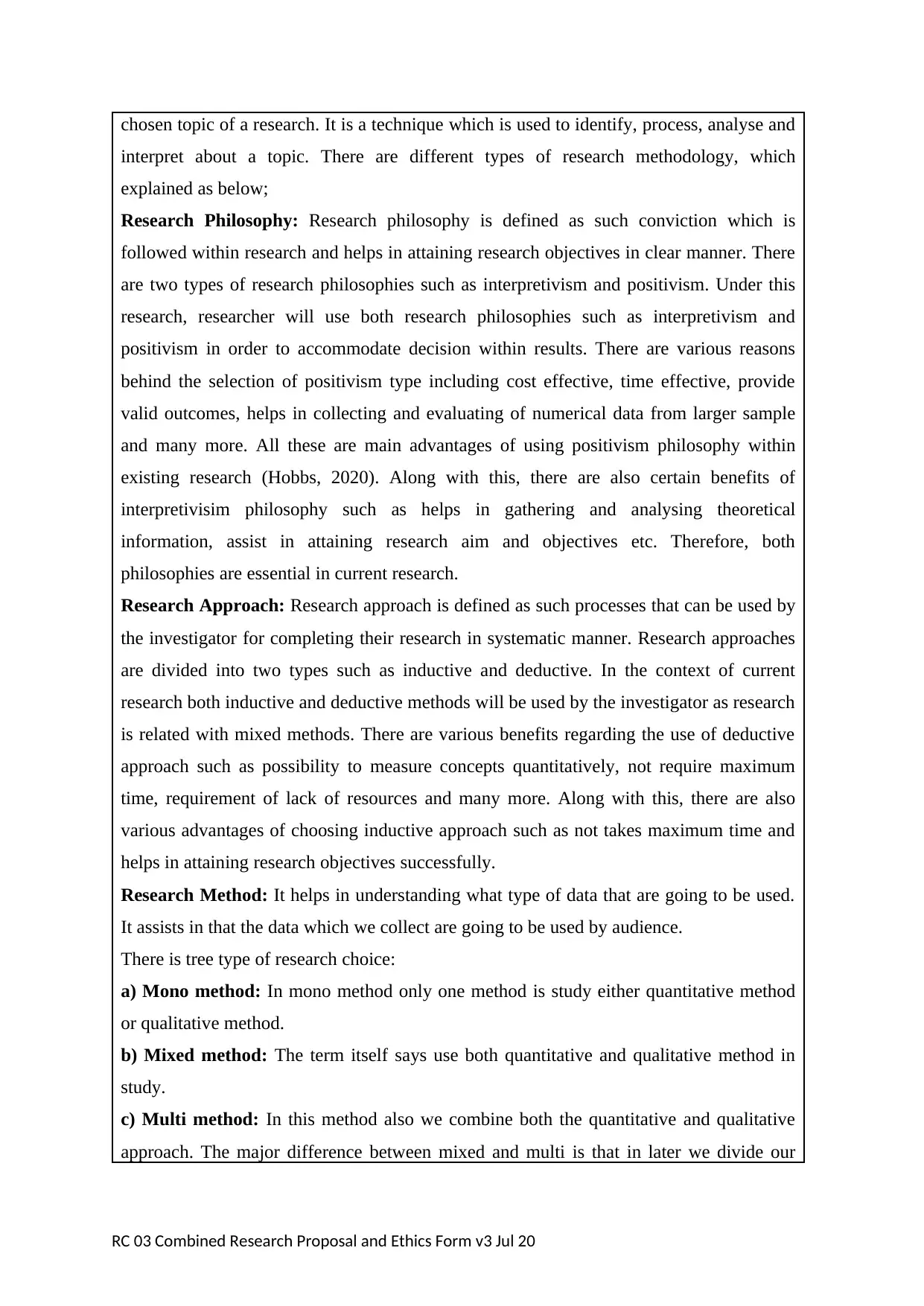
chosen topic of a research. It is a technique which is used to identify, process, analyse and
interpret about a topic. There are different types of research methodology, which
explained as below;
Research Philosophy: Research philosophy is defined as such conviction which is
followed within research and helps in attaining research objectives in clear manner. There
are two types of research philosophies such as interpretivism and positivism. Under this
research, researcher will use both research philosophies such as interpretivism and
positivism in order to accommodate decision within results. There are various reasons
behind the selection of positivism type including cost effective, time effective, provide
valid outcomes, helps in collecting and evaluating of numerical data from larger sample
and many more. All these are main advantages of using positivism philosophy within
existing research (Hobbs, 2020). Along with this, there are also certain benefits of
interpretivisim philosophy such as helps in gathering and analysing theoretical
information, assist in attaining research aim and objectives etc. Therefore, both
philosophies are essential in current research.
Research Approach: Research approach is defined as such processes that can be used by
the investigator for completing their research in systematic manner. Research approaches
are divided into two types such as inductive and deductive. In the context of current
research both inductive and deductive methods will be used by the investigator as research
is related with mixed methods. There are various benefits regarding the use of deductive
approach such as possibility to measure concepts quantitatively, not require maximum
time, requirement of lack of resources and many more. Along with this, there are also
various advantages of choosing inductive approach such as not takes maximum time and
helps in attaining research objectives successfully.
Research Method: It helps in understanding what type of data that are going to be used.
It assists in that the data which we collect are going to be used by audience.
There is tree type of research choice:
a) Mono method: In mono method only one method is study either quantitative method
or qualitative method.
b) Mixed method: The term itself says use both quantitative and qualitative method in
study.
c) Multi method: In this method also we combine both the quantitative and qualitative
approach. The major difference between mixed and multi is that in later we divide our
RC 03 Combined Research Proposal and Ethics Form v3 Jul 20
interpret about a topic. There are different types of research methodology, which
explained as below;
Research Philosophy: Research philosophy is defined as such conviction which is
followed within research and helps in attaining research objectives in clear manner. There
are two types of research philosophies such as interpretivism and positivism. Under this
research, researcher will use both research philosophies such as interpretivism and
positivism in order to accommodate decision within results. There are various reasons
behind the selection of positivism type including cost effective, time effective, provide
valid outcomes, helps in collecting and evaluating of numerical data from larger sample
and many more. All these are main advantages of using positivism philosophy within
existing research (Hobbs, 2020). Along with this, there are also certain benefits of
interpretivisim philosophy such as helps in gathering and analysing theoretical
information, assist in attaining research aim and objectives etc. Therefore, both
philosophies are essential in current research.
Research Approach: Research approach is defined as such processes that can be used by
the investigator for completing their research in systematic manner. Research approaches
are divided into two types such as inductive and deductive. In the context of current
research both inductive and deductive methods will be used by the investigator as research
is related with mixed methods. There are various benefits regarding the use of deductive
approach such as possibility to measure concepts quantitatively, not require maximum
time, requirement of lack of resources and many more. Along with this, there are also
various advantages of choosing inductive approach such as not takes maximum time and
helps in attaining research objectives successfully.
Research Method: It helps in understanding what type of data that are going to be used.
It assists in that the data which we collect are going to be used by audience.
There is tree type of research choice:
a) Mono method: In mono method only one method is study either quantitative method
or qualitative method.
b) Mixed method: The term itself says use both quantitative and qualitative method in
study.
c) Multi method: In this method also we combine both the quantitative and qualitative
approach. The major difference between mixed and multi is that in later we divide our
RC 03 Combined Research Proposal and Ethics Form v3 Jul 20
⊘ This is a preview!⊘
Do you want full access?
Subscribe today to unlock all pages.

Trusted by 1+ million students worldwide
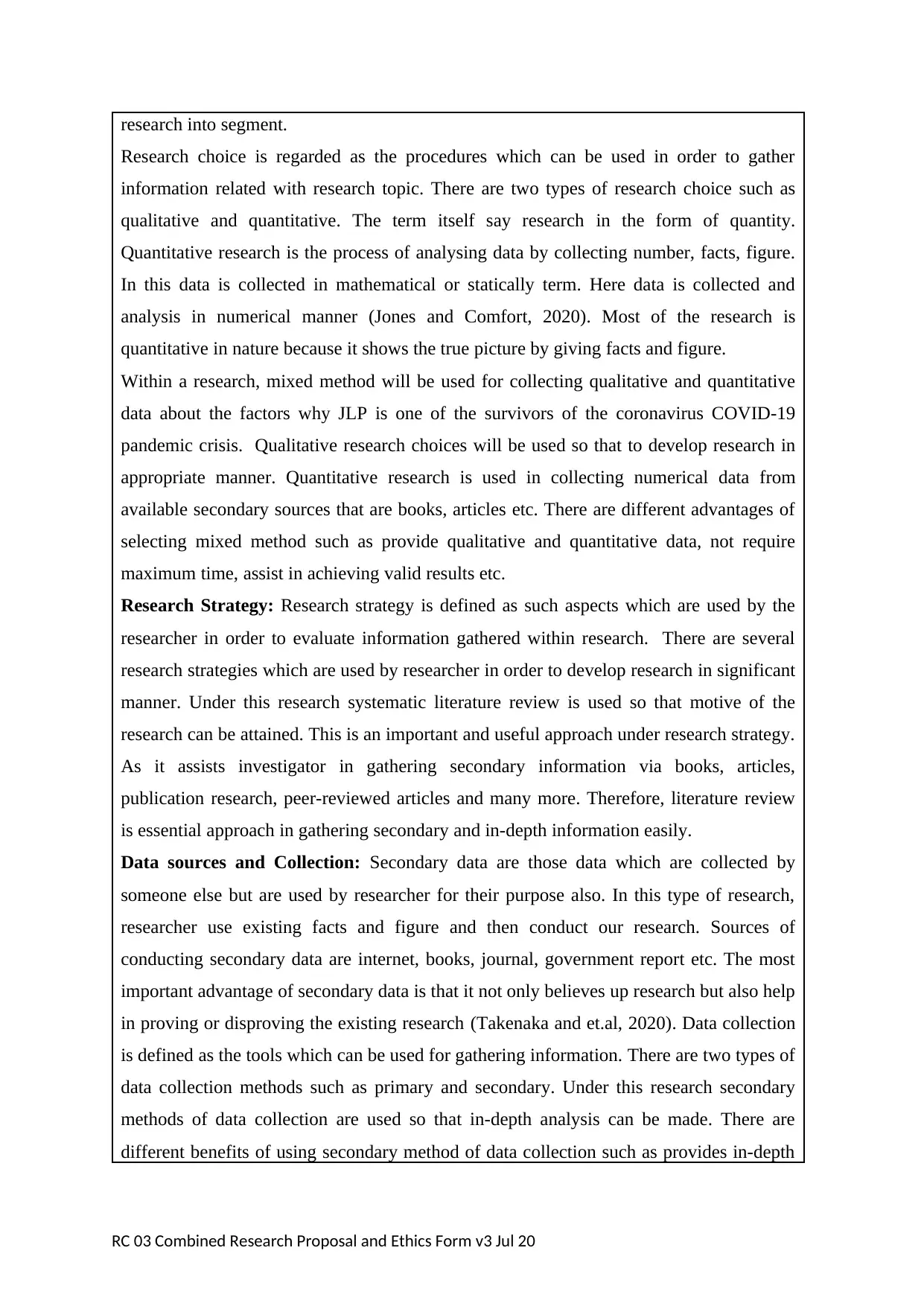
research into segment.
Research choice is regarded as the procedures which can be used in order to gather
information related with research topic. There are two types of research choice such as
qualitative and quantitative. The term itself say research in the form of quantity.
Quantitative research is the process of analysing data by collecting number, facts, figure.
In this data is collected in mathematical or statically term. Here data is collected and
analysis in numerical manner (Jones and Comfort, 2020). Most of the research is
quantitative in nature because it shows the true picture by giving facts and figure.
Within a research, mixed method will be used for collecting qualitative and quantitative
data about the factors why JLP is one of the survivors of the coronavirus COVID-19
pandemic crisis. Qualitative research choices will be used so that to develop research in
appropriate manner. Quantitative research is used in collecting numerical data from
available secondary sources that are books, articles etc. There are different advantages of
selecting mixed method such as provide qualitative and quantitative data, not require
maximum time, assist in achieving valid results etc.
Research Strategy: Research strategy is defined as such aspects which are used by the
researcher in order to evaluate information gathered within research. There are several
research strategies which are used by researcher in order to develop research in significant
manner. Under this research systematic literature review is used so that motive of the
research can be attained. This is an important and useful approach under research strategy.
As it assists investigator in gathering secondary information via books, articles,
publication research, peer-reviewed articles and many more. Therefore, literature review
is essential approach in gathering secondary and in-depth information easily.
Data sources and Collection: Secondary data are those data which are collected by
someone else but are used by researcher for their purpose also. In this type of research,
researcher use existing facts and figure and then conduct our research. Sources of
conducting secondary data are internet, books, journal, government report etc. The most
important advantage of secondary data is that it not only believes up research but also help
in proving or disproving the existing research (Takenaka and et.al, 2020). Data collection
is defined as the tools which can be used for gathering information. There are two types of
data collection methods such as primary and secondary. Under this research secondary
methods of data collection are used so that in-depth analysis can be made. There are
different benefits of using secondary method of data collection such as provides in-depth
RC 03 Combined Research Proposal and Ethics Form v3 Jul 20
Research choice is regarded as the procedures which can be used in order to gather
information related with research topic. There are two types of research choice such as
qualitative and quantitative. The term itself say research in the form of quantity.
Quantitative research is the process of analysing data by collecting number, facts, figure.
In this data is collected in mathematical or statically term. Here data is collected and
analysis in numerical manner (Jones and Comfort, 2020). Most of the research is
quantitative in nature because it shows the true picture by giving facts and figure.
Within a research, mixed method will be used for collecting qualitative and quantitative
data about the factors why JLP is one of the survivors of the coronavirus COVID-19
pandemic crisis. Qualitative research choices will be used so that to develop research in
appropriate manner. Quantitative research is used in collecting numerical data from
available secondary sources that are books, articles etc. There are different advantages of
selecting mixed method such as provide qualitative and quantitative data, not require
maximum time, assist in achieving valid results etc.
Research Strategy: Research strategy is defined as such aspects which are used by the
researcher in order to evaluate information gathered within research. There are several
research strategies which are used by researcher in order to develop research in significant
manner. Under this research systematic literature review is used so that motive of the
research can be attained. This is an important and useful approach under research strategy.
As it assists investigator in gathering secondary information via books, articles,
publication research, peer-reviewed articles and many more. Therefore, literature review
is essential approach in gathering secondary and in-depth information easily.
Data sources and Collection: Secondary data are those data which are collected by
someone else but are used by researcher for their purpose also. In this type of research,
researcher use existing facts and figure and then conduct our research. Sources of
conducting secondary data are internet, books, journal, government report etc. The most
important advantage of secondary data is that it not only believes up research but also help
in proving or disproving the existing research (Takenaka and et.al, 2020). Data collection
is defined as the tools which can be used for gathering information. There are two types of
data collection methods such as primary and secondary. Under this research secondary
methods of data collection are used so that in-depth analysis can be made. There are
different benefits of using secondary method of data collection such as provides in-depth
RC 03 Combined Research Proposal and Ethics Form v3 Jul 20
Paraphrase This Document
Need a fresh take? Get an instant paraphrase of this document with our AI Paraphraser
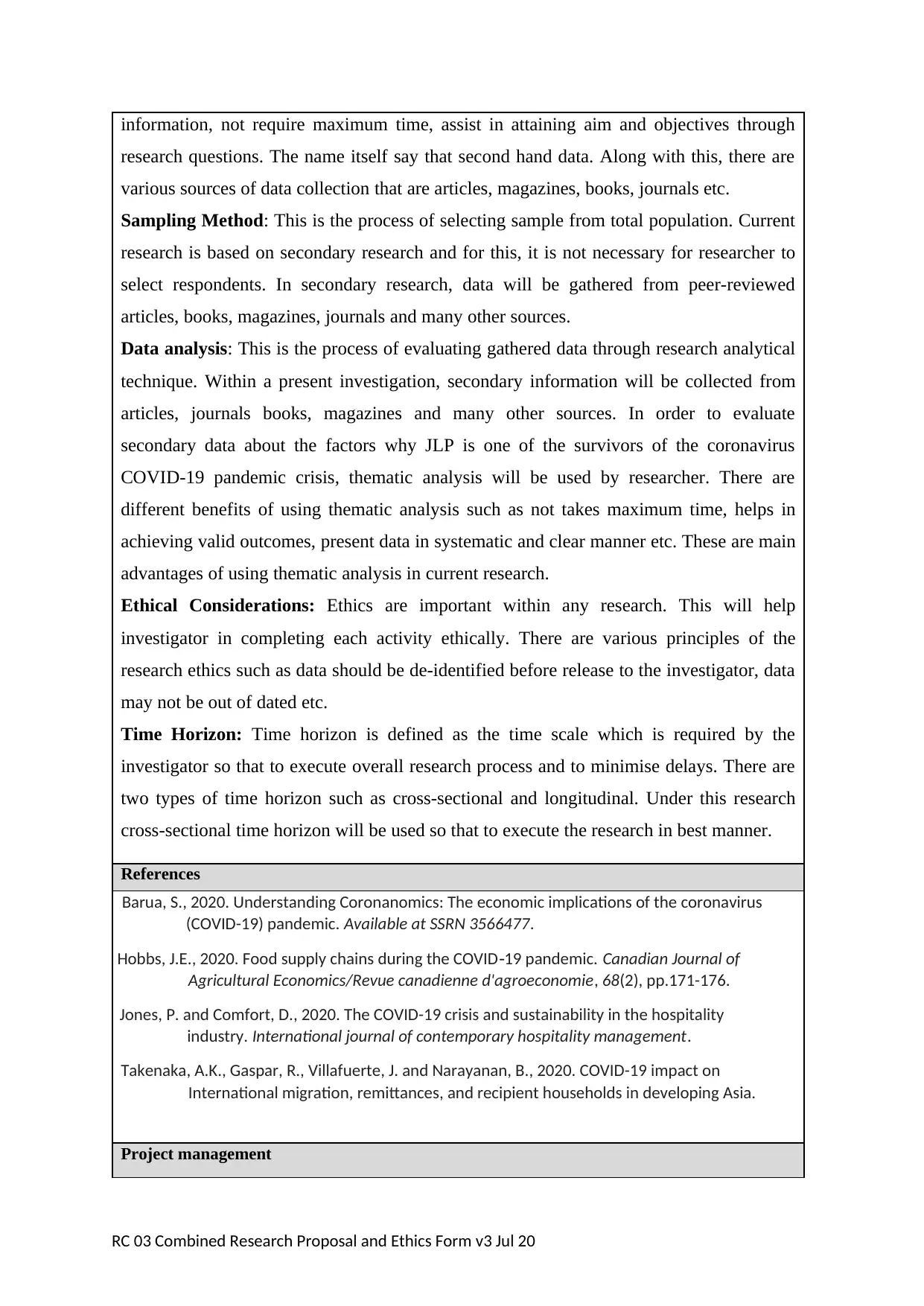
information, not require maximum time, assist in attaining aim and objectives through
research questions. The name itself say that second hand data. Along with this, there are
various sources of data collection that are articles, magazines, books, journals etc.
Sampling Method: This is the process of selecting sample from total population. Current
research is based on secondary research and for this, it is not necessary for researcher to
select respondents. In secondary research, data will be gathered from peer-reviewed
articles, books, magazines, journals and many other sources.
Data analysis: This is the process of evaluating gathered data through research analytical
technique. Within a present investigation, secondary information will be collected from
articles, journals books, magazines and many other sources. In order to evaluate
secondary data about the factors why JLP is one of the survivors of the coronavirus
COVID-19 pandemic crisis, thematic analysis will be used by researcher. There are
different benefits of using thematic analysis such as not takes maximum time, helps in
achieving valid outcomes, present data in systematic and clear manner etc. These are main
advantages of using thematic analysis in current research.
Ethical Considerations: Ethics are important within any research. This will help
investigator in completing each activity ethically. There are various principles of the
research ethics such as data should be de-identified before release to the investigator, data
may not be out of dated etc.
Time Horizon: Time horizon is defined as the time scale which is required by the
investigator so that to execute overall research process and to minimise delays. There are
two types of time horizon such as cross-sectional and longitudinal. Under this research
cross-sectional time horizon will be used so that to execute the research in best manner.
References
Barua, S., 2020. Understanding Coronanomics: The economic implications of the coronavirus
(COVID-19) pandemic. Available at SSRN 3566477.
Hobbs, J.E., 2020. Food supply chains during the COVID 19 pandemic.‐ Canadian Journal of
Agricultural Economics/Revue canadienne d'agroeconomie, 68(2), pp.171-176.
Jones, P. and Comfort, D., 2020. The COVID-19 crisis and sustainability in the hospitality
industry. International journal of contemporary hospitality management.
Takenaka, A.K., Gaspar, R., Villafuerte, J. and Narayanan, B., 2020. COVID-19 impact on
International migration, remittances, and recipient households in developing Asia.
Project management
RC 03 Combined Research Proposal and Ethics Form v3 Jul 20
research questions. The name itself say that second hand data. Along with this, there are
various sources of data collection that are articles, magazines, books, journals etc.
Sampling Method: This is the process of selecting sample from total population. Current
research is based on secondary research and for this, it is not necessary for researcher to
select respondents. In secondary research, data will be gathered from peer-reviewed
articles, books, magazines, journals and many other sources.
Data analysis: This is the process of evaluating gathered data through research analytical
technique. Within a present investigation, secondary information will be collected from
articles, journals books, magazines and many other sources. In order to evaluate
secondary data about the factors why JLP is one of the survivors of the coronavirus
COVID-19 pandemic crisis, thematic analysis will be used by researcher. There are
different benefits of using thematic analysis such as not takes maximum time, helps in
achieving valid outcomes, present data in systematic and clear manner etc. These are main
advantages of using thematic analysis in current research.
Ethical Considerations: Ethics are important within any research. This will help
investigator in completing each activity ethically. There are various principles of the
research ethics such as data should be de-identified before release to the investigator, data
may not be out of dated etc.
Time Horizon: Time horizon is defined as the time scale which is required by the
investigator so that to execute overall research process and to minimise delays. There are
two types of time horizon such as cross-sectional and longitudinal. Under this research
cross-sectional time horizon will be used so that to execute the research in best manner.
References
Barua, S., 2020. Understanding Coronanomics: The economic implications of the coronavirus
(COVID-19) pandemic. Available at SSRN 3566477.
Hobbs, J.E., 2020. Food supply chains during the COVID 19 pandemic.‐ Canadian Journal of
Agricultural Economics/Revue canadienne d'agroeconomie, 68(2), pp.171-176.
Jones, P. and Comfort, D., 2020. The COVID-19 crisis and sustainability in the hospitality
industry. International journal of contemporary hospitality management.
Takenaka, A.K., Gaspar, R., Villafuerte, J. and Narayanan, B., 2020. COVID-19 impact on
International migration, remittances, and recipient households in developing Asia.
Project management
RC 03 Combined Research Proposal and Ethics Form v3 Jul 20
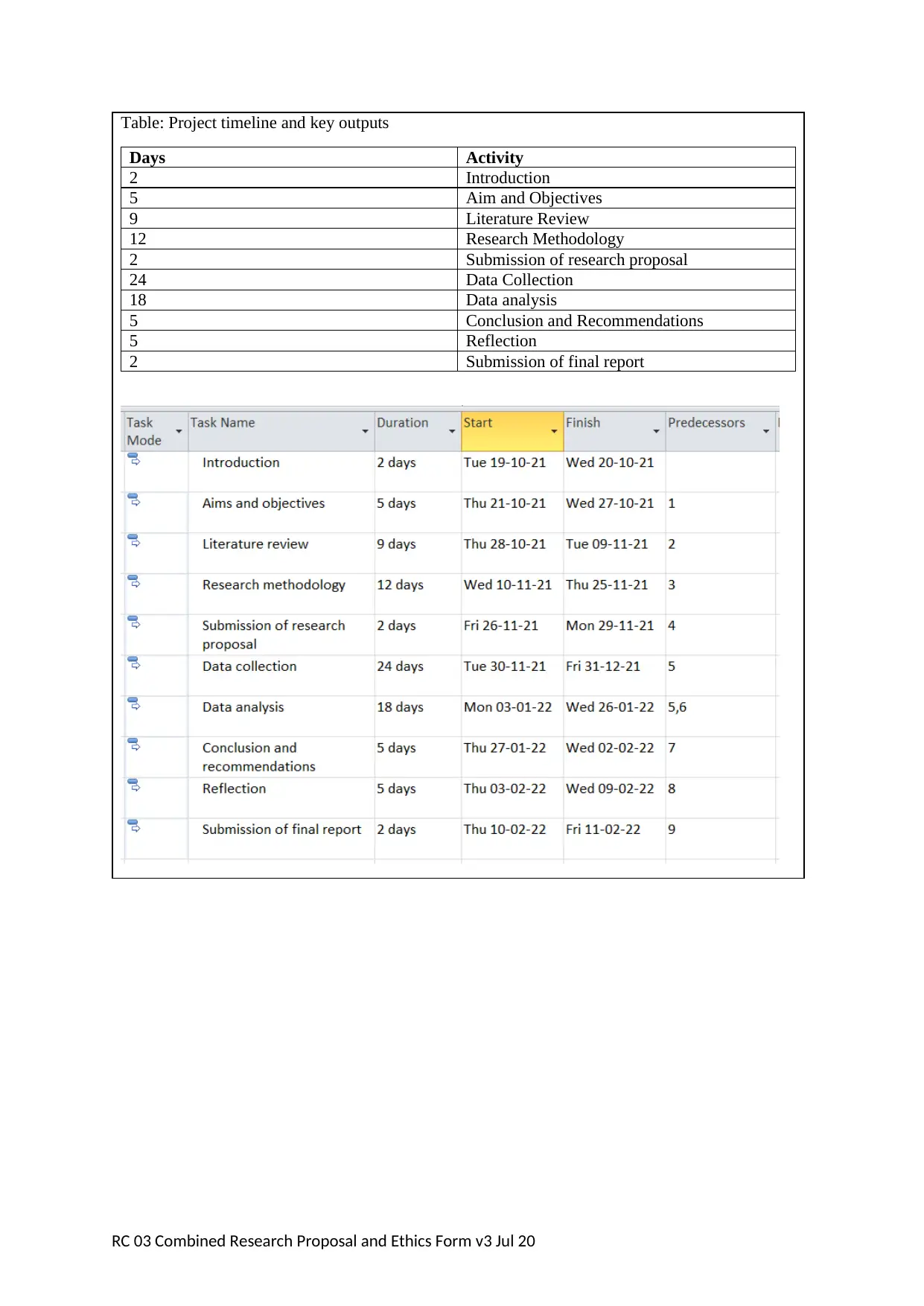
Table: Project timeline and key outputs
Days Activity
2 Introduction
5 Aim and Objectives
9 Literature Review
12 Research Methodology
2 Submission of research proposal
24 Data Collection
18 Data analysis
5 Conclusion and Recommendations
5 Reflection
2 Submission of final report
RC 03 Combined Research Proposal and Ethics Form v3 Jul 20
Days Activity
2 Introduction
5 Aim and Objectives
9 Literature Review
12 Research Methodology
2 Submission of research proposal
24 Data Collection
18 Data analysis
5 Conclusion and Recommendations
5 Reflection
2 Submission of final report
RC 03 Combined Research Proposal and Ethics Form v3 Jul 20
⊘ This is a preview!⊘
Do you want full access?
Subscribe today to unlock all pages.

Trusted by 1+ million students worldwide
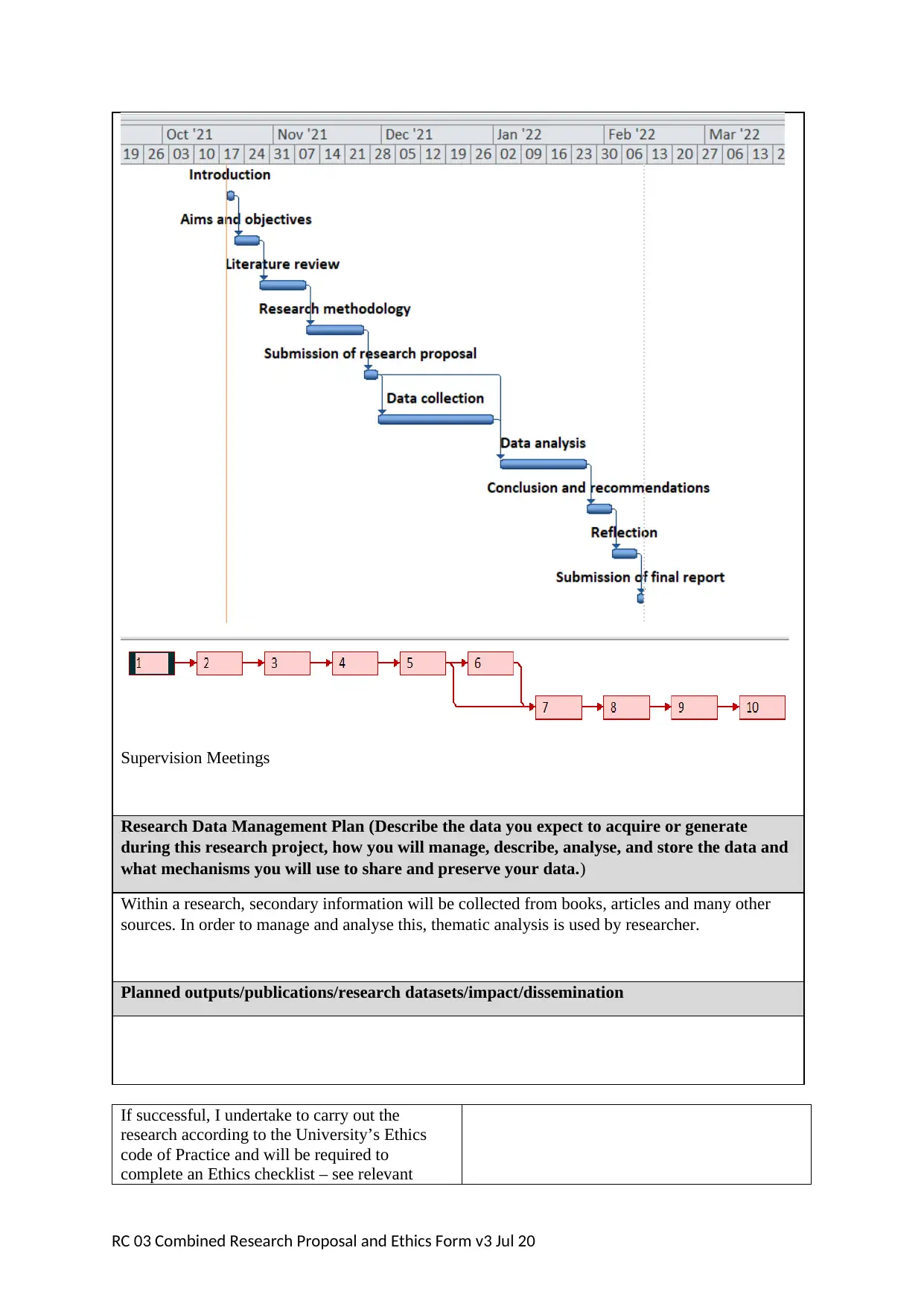
Supervision Meetings
Research Data Management Plan (Describe the data you expect to acquire or generate
during this research project, how you will manage, describe, analyse, and store the data and
what mechanisms you will use to share and preserve your data.)
Within a research, secondary information will be collected from books, articles and many other
sources. In order to manage and analyse this, thematic analysis is used by researcher.
Planned outputs/publications/research datasets/impact/dissemination
If successful, I undertake to carry out the
research according to the University’s Ethics
code of Practice and will be required to
complete an Ethics checklist – see relevant
RC 03 Combined Research Proposal and Ethics Form v3 Jul 20
Research Data Management Plan (Describe the data you expect to acquire or generate
during this research project, how you will manage, describe, analyse, and store the data and
what mechanisms you will use to share and preserve your data.)
Within a research, secondary information will be collected from books, articles and many other
sources. In order to manage and analyse this, thematic analysis is used by researcher.
Planned outputs/publications/research datasets/impact/dissemination
If successful, I undertake to carry out the
research according to the University’s Ethics
code of Practice and will be required to
complete an Ethics checklist – see relevant
RC 03 Combined Research Proposal and Ethics Form v3 Jul 20
Paraphrase This Document
Need a fresh take? Get an instant paraphrase of this document with our AI Paraphraser
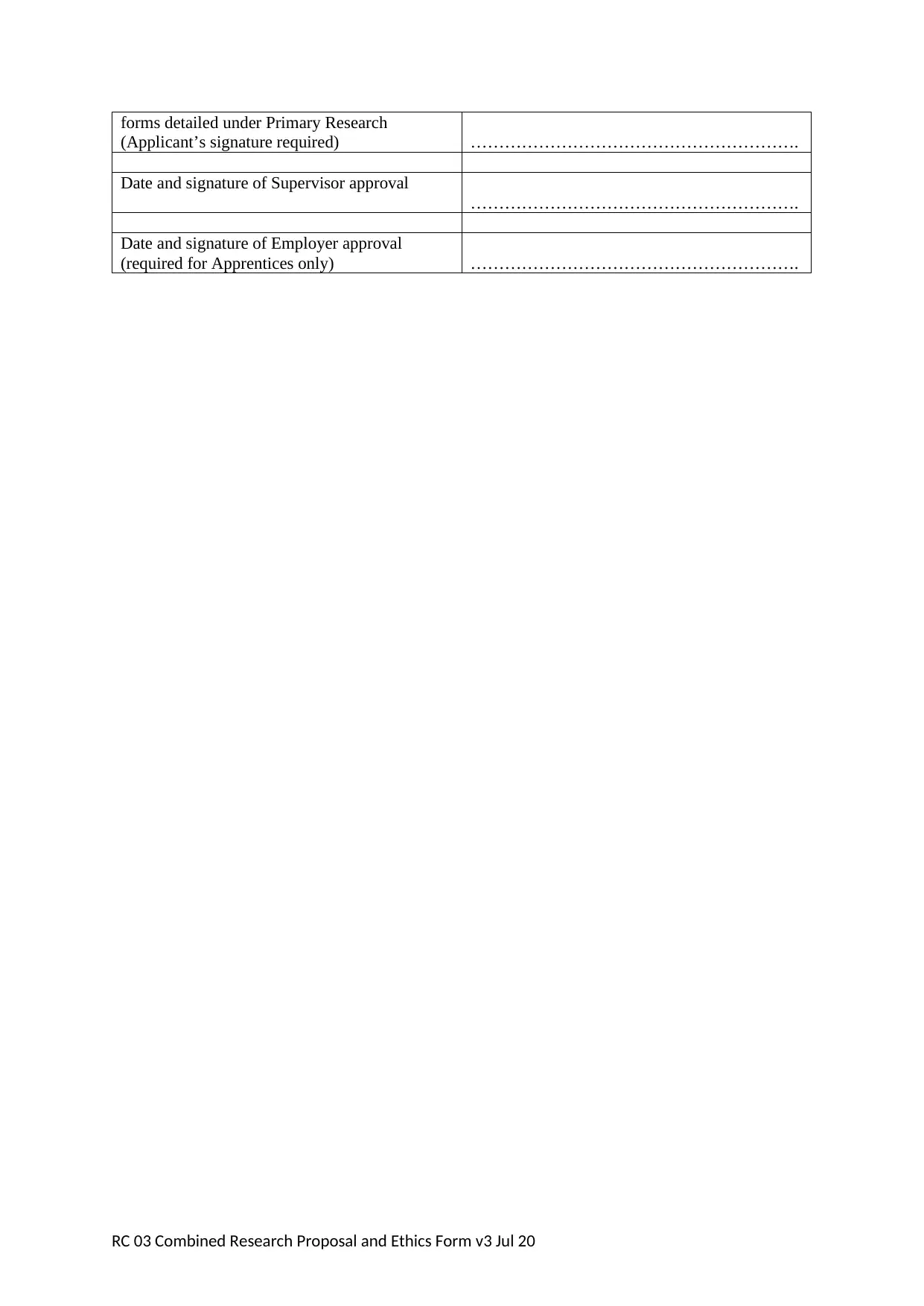
forms detailed under Primary Research
(Applicant’s signature required) ………………………………………………….
Date and signature of Supervisor approval
………………………………………………….
Date and signature of Employer approval
(required for Apprentices only) ………………………………………………….
RC 03 Combined Research Proposal and Ethics Form v3 Jul 20
(Applicant’s signature required) ………………………………………………….
Date and signature of Supervisor approval
………………………………………………….
Date and signature of Employer approval
(required for Apprentices only) ………………………………………………….
RC 03 Combined Research Proposal and Ethics Form v3 Jul 20
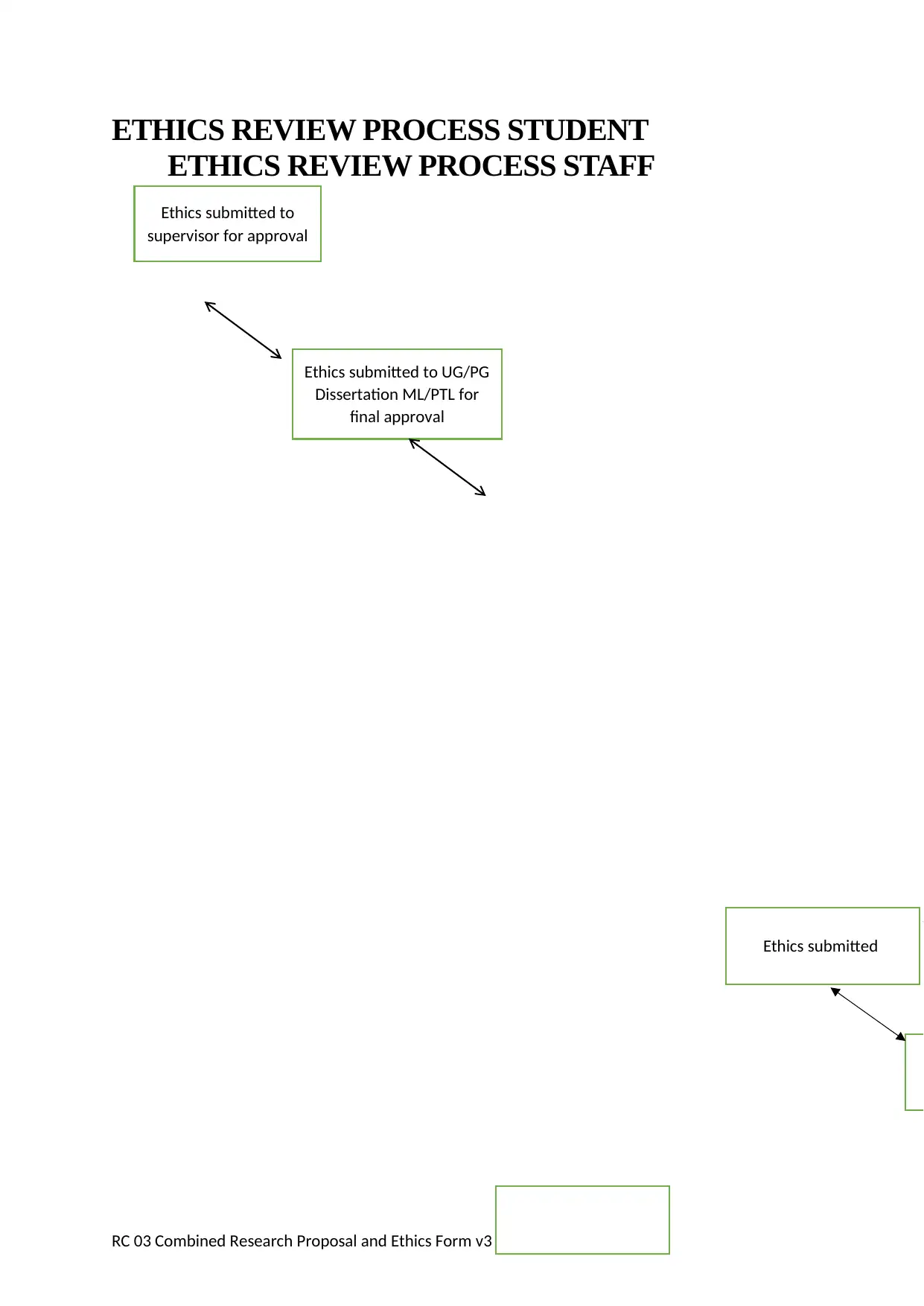
ETHICS REVIEW PROCESS STUDENT
ETHICS REVIEW PROCESS STAFF
RC 03 Combined Research Proposal and Ethics Form v3 Jul 20
Ethics submitted to
supervisor for approval
Ethics submitted to UG/PG
Dissertation ML/PTL for
final approval
Ethics submitted
ETHICS REVIEW PROCESS STAFF
RC 03 Combined Research Proposal and Ethics Form v3 Jul 20
Ethics submitted to
supervisor for approval
Ethics submitted to UG/PG
Dissertation ML/PTL for
final approval
Ethics submitted
⊘ This is a preview!⊘
Do you want full access?
Subscribe today to unlock all pages.

Trusted by 1+ million students worldwide
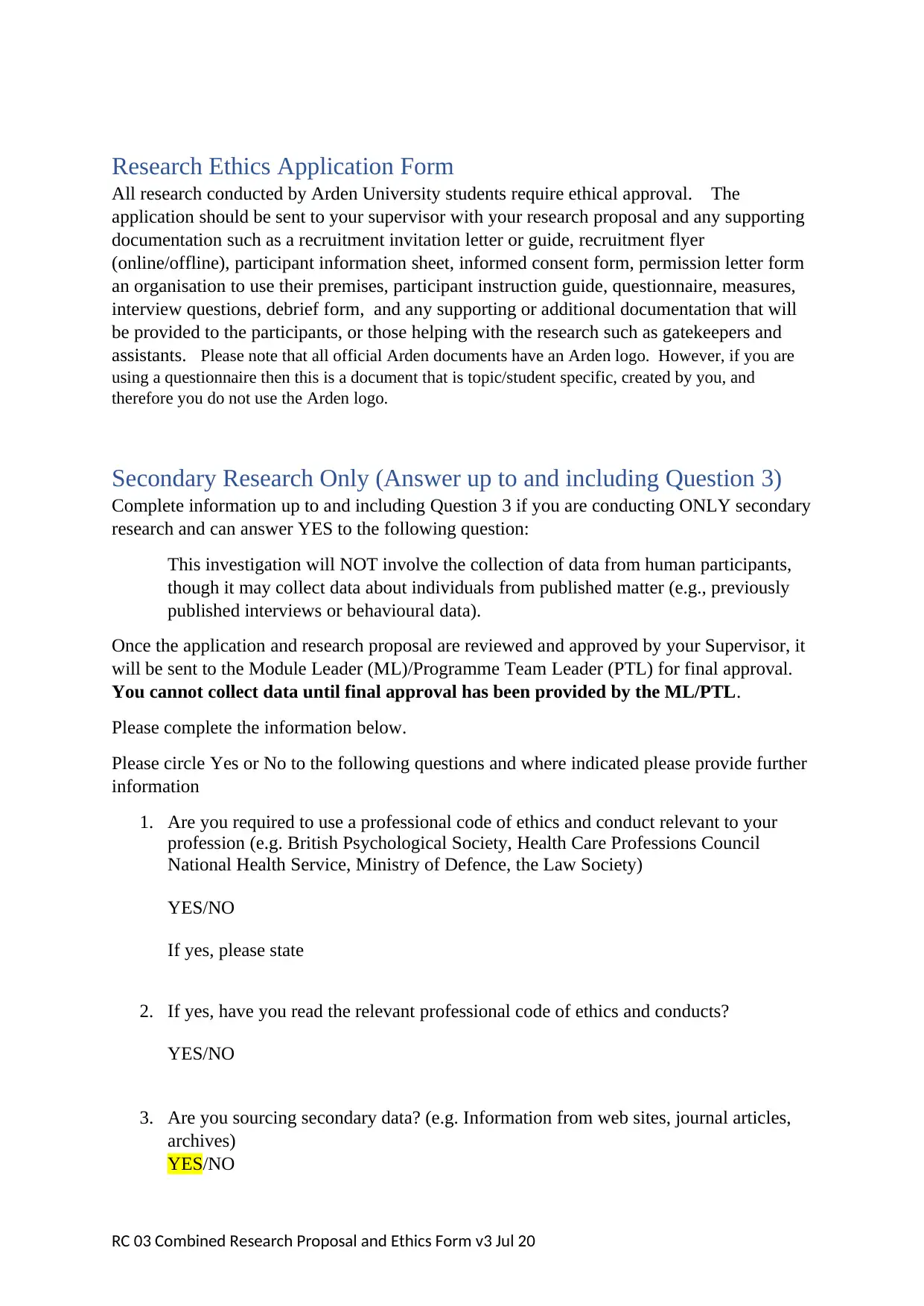
Research Ethics Application Form
All research conducted by Arden University students require ethical approval. The
application should be sent to your supervisor with your research proposal and any supporting
documentation such as a recruitment invitation letter or guide, recruitment flyer
(online/offline), participant information sheet, informed consent form, permission letter form
an organisation to use their premises, participant instruction guide, questionnaire, measures,
interview questions, debrief form, and any supporting or additional documentation that will
be provided to the participants, or those helping with the research such as gatekeepers and
assistants. Please note that all official Arden documents have an Arden logo. However, if you are
using a questionnaire then this is a document that is topic/student specific, created by you, and
therefore you do not use the Arden logo.
Secondary Research Only (Answer up to and including Question 3)
Complete information up to and including Question 3 if you are conducting ONLY secondary
research and can answer YES to the following question:
This investigation will NOT involve the collection of data from human participants,
though it may collect data about individuals from published matter (e.g., previously
published interviews or behavioural data).
Once the application and research proposal are reviewed and approved by your Supervisor, it
will be sent to the Module Leader (ML)/Programme Team Leader (PTL) for final approval.
You cannot collect data until final approval has been provided by the ML/PTL.
Please complete the information below.
Please circle Yes or No to the following questions and where indicated please provide further
information
1. Are you required to use a professional code of ethics and conduct relevant to your
profession (e.g. British Psychological Society, Health Care Professions Council
National Health Service, Ministry of Defence, the Law Society)
YES/NO
If yes, please state
2. If yes, have you read the relevant professional code of ethics and conducts?
YES/NO
3. Are you sourcing secondary data? (e.g. Information from web sites, journal articles,
archives)
YES/NO
RC 03 Combined Research Proposal and Ethics Form v3 Jul 20
All research conducted by Arden University students require ethical approval. The
application should be sent to your supervisor with your research proposal and any supporting
documentation such as a recruitment invitation letter or guide, recruitment flyer
(online/offline), participant information sheet, informed consent form, permission letter form
an organisation to use their premises, participant instruction guide, questionnaire, measures,
interview questions, debrief form, and any supporting or additional documentation that will
be provided to the participants, or those helping with the research such as gatekeepers and
assistants. Please note that all official Arden documents have an Arden logo. However, if you are
using a questionnaire then this is a document that is topic/student specific, created by you, and
therefore you do not use the Arden logo.
Secondary Research Only (Answer up to and including Question 3)
Complete information up to and including Question 3 if you are conducting ONLY secondary
research and can answer YES to the following question:
This investigation will NOT involve the collection of data from human participants,
though it may collect data about individuals from published matter (e.g., previously
published interviews or behavioural data).
Once the application and research proposal are reviewed and approved by your Supervisor, it
will be sent to the Module Leader (ML)/Programme Team Leader (PTL) for final approval.
You cannot collect data until final approval has been provided by the ML/PTL.
Please complete the information below.
Please circle Yes or No to the following questions and where indicated please provide further
information
1. Are you required to use a professional code of ethics and conduct relevant to your
profession (e.g. British Psychological Society, Health Care Professions Council
National Health Service, Ministry of Defence, the Law Society)
YES/NO
If yes, please state
2. If yes, have you read the relevant professional code of ethics and conducts?
YES/NO
3. Are you sourcing secondary data? (e.g. Information from web sites, journal articles,
archives)
YES/NO
RC 03 Combined Research Proposal and Ethics Form v3 Jul 20
Paraphrase This Document
Need a fresh take? Get an instant paraphrase of this document with our AI Paraphraser

If yes, please provide details
Books, journals etc. sources will be used for collecting secondary information about the
topic.
RC 03 Combined Research Proposal and Ethics Form v3 Jul 20
Books, journals etc. sources will be used for collecting secondary information about the
topic.
RC 03 Combined Research Proposal and Ethics Form v3 Jul 20
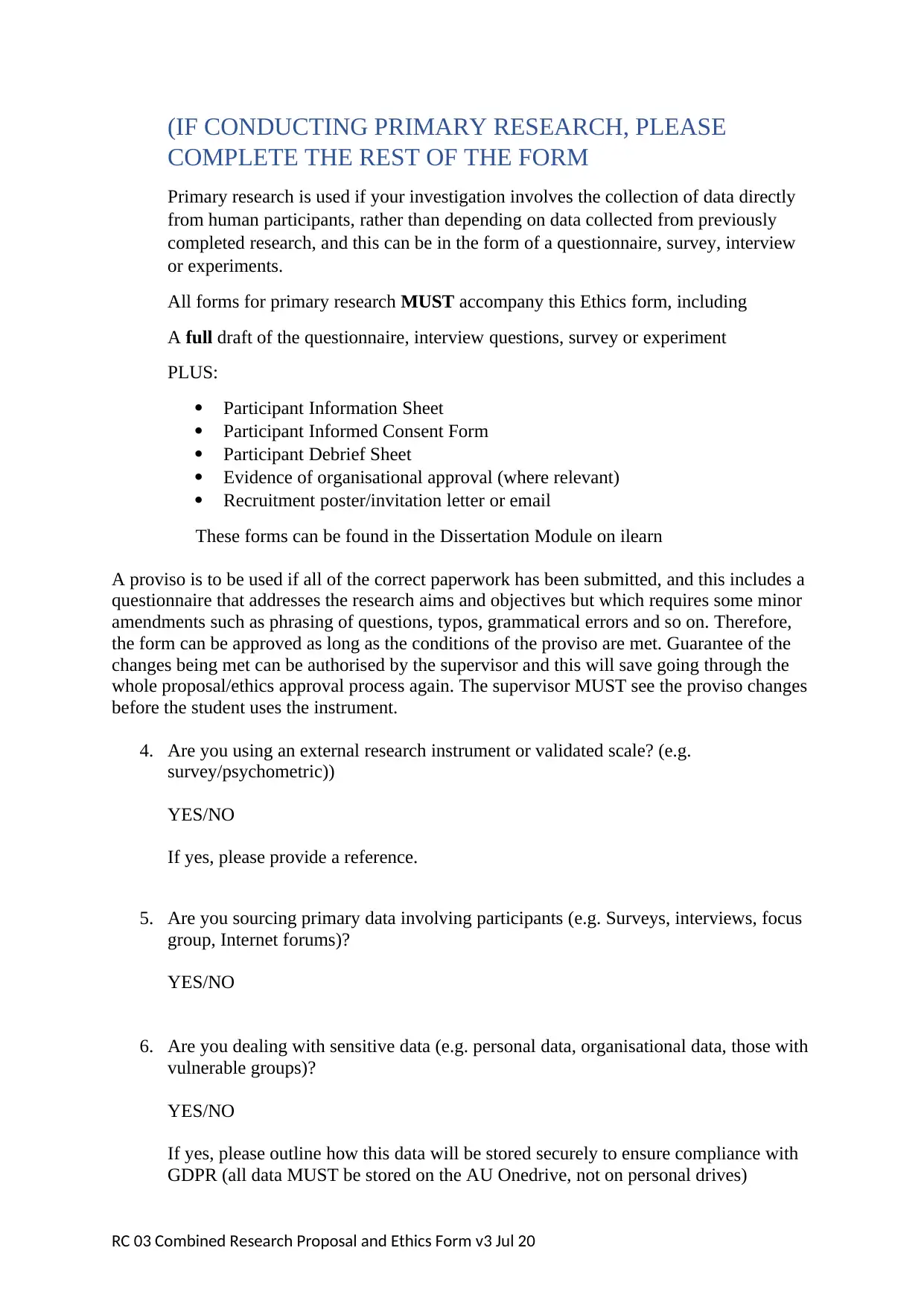
(IF CONDUCTING PRIMARY RESEARCH, PLEASE
COMPLETE THE REST OF THE FORM
Primary research is used if your investigation involves the collection of data directly
from human participants, rather than depending on data collected from previously
completed research, and this can be in the form of a questionnaire, survey, interview
or experiments.
All forms for primary research MUST accompany this Ethics form, including
A full draft of the questionnaire, interview questions, survey or experiment
PLUS:
Participant Information Sheet
Participant Informed Consent Form
Participant Debrief Sheet
Evidence of organisational approval (where relevant)
Recruitment poster/invitation letter or email
These forms can be found in the Dissertation Module on ilearn
A proviso is to be used if all of the correct paperwork has been submitted, and this includes a
questionnaire that addresses the research aims and objectives but which requires some minor
amendments such as phrasing of questions, typos, grammatical errors and so on. Therefore,
the form can be approved as long as the conditions of the proviso are met. Guarantee of the
changes being met can be authorised by the supervisor and this will save going through the
whole proposal/ethics approval process again. The supervisor MUST see the proviso changes
before the student uses the instrument.
4. Are you using an external research instrument or validated scale? (e.g.
survey/psychometric))
YES/NO
If yes, please provide a reference.
5. Are you sourcing primary data involving participants (e.g. Surveys, interviews, focus
group, Internet forums)?
YES/NO
6. Are you dealing with sensitive data (e.g. personal data, organisational data, those with
vulnerable groups)?
YES/NO
If yes, please outline how this data will be stored securely to ensure compliance with
GDPR (all data MUST be stored on the AU Onedrive, not on personal drives)
RC 03 Combined Research Proposal and Ethics Form v3 Jul 20
COMPLETE THE REST OF THE FORM
Primary research is used if your investigation involves the collection of data directly
from human participants, rather than depending on data collected from previously
completed research, and this can be in the form of a questionnaire, survey, interview
or experiments.
All forms for primary research MUST accompany this Ethics form, including
A full draft of the questionnaire, interview questions, survey or experiment
PLUS:
Participant Information Sheet
Participant Informed Consent Form
Participant Debrief Sheet
Evidence of organisational approval (where relevant)
Recruitment poster/invitation letter or email
These forms can be found in the Dissertation Module on ilearn
A proviso is to be used if all of the correct paperwork has been submitted, and this includes a
questionnaire that addresses the research aims and objectives but which requires some minor
amendments such as phrasing of questions, typos, grammatical errors and so on. Therefore,
the form can be approved as long as the conditions of the proviso are met. Guarantee of the
changes being met can be authorised by the supervisor and this will save going through the
whole proposal/ethics approval process again. The supervisor MUST see the proviso changes
before the student uses the instrument.
4. Are you using an external research instrument or validated scale? (e.g.
survey/psychometric))
YES/NO
If yes, please provide a reference.
5. Are you sourcing primary data involving participants (e.g. Surveys, interviews, focus
group, Internet forums)?
YES/NO
6. Are you dealing with sensitive data (e.g. personal data, organisational data, those with
vulnerable groups)?
YES/NO
If yes, please outline how this data will be stored securely to ensure compliance with
GDPR (all data MUST be stored on the AU Onedrive, not on personal drives)
RC 03 Combined Research Proposal and Ethics Form v3 Jul 20
⊘ This is a preview!⊘
Do you want full access?
Subscribe today to unlock all pages.

Trusted by 1+ million students worldwide
1 out of 16
Related Documents
Your All-in-One AI-Powered Toolkit for Academic Success.
+13062052269
info@desklib.com
Available 24*7 on WhatsApp / Email
![[object Object]](/_next/static/media/star-bottom.7253800d.svg)
Unlock your academic potential
Copyright © 2020–2026 A2Z Services. All Rights Reserved. Developed and managed by ZUCOL.





